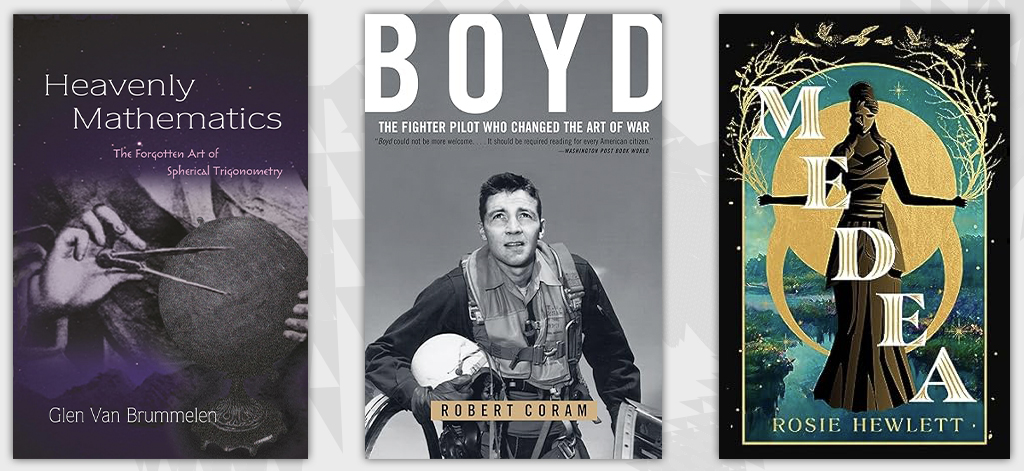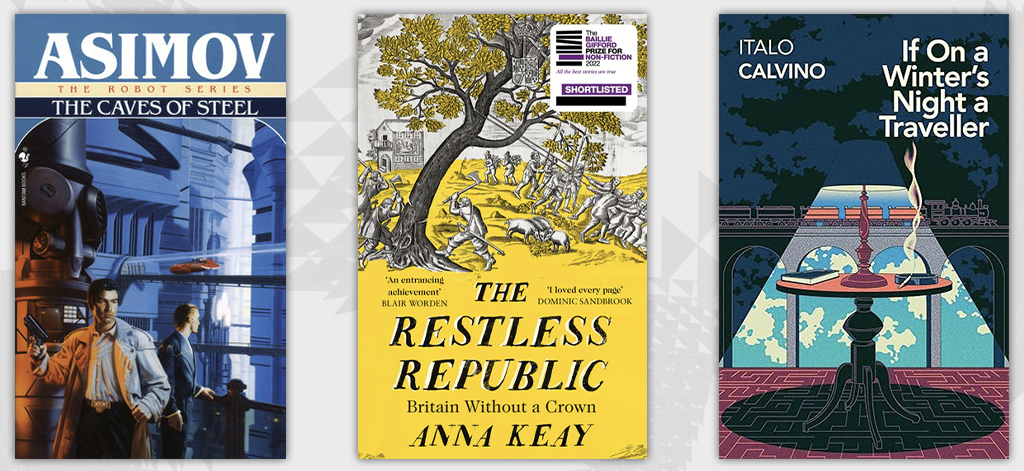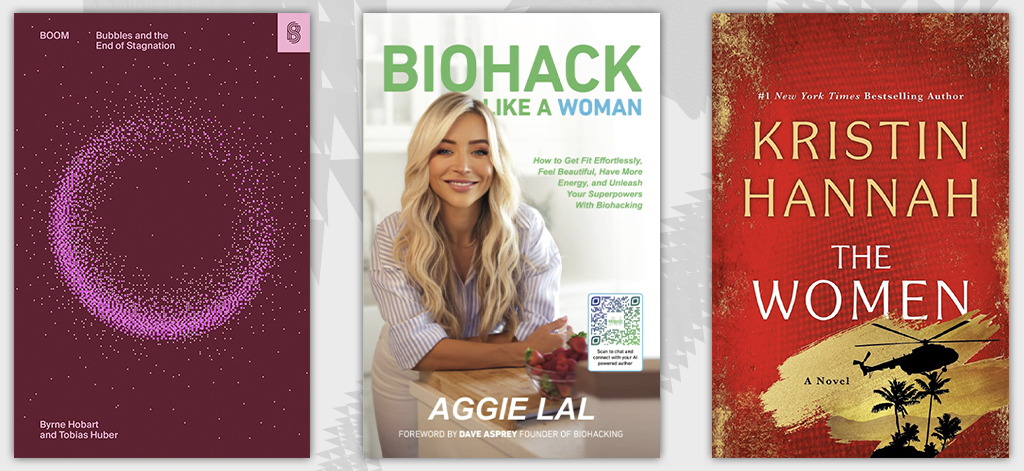Here are a few of the books the a16z crypto team is reading and recommending this winter. This list has something for everyone, from spherical geometry to celebrity autobiographies, and from the science of supervolcanoes to science fiction.
Repeat recommendations reveal our longstanding interests. This season’s repeats included Shoe Dog: A Memoir by the Creator of Nike by Phil Knight on the making and running of an iconic shoe brand, and James Clear’s Atomic Habits: An Easy & Proven Way to Build Good Habits & Break Bad Ones, a favorite resource for kicking off new habits and mindsets in the new year.
See more of our recommendations in reading lists from seasons past: including summers 2024, 2023, 2022, 2019; and winters 2023, 2022, 2018, 2017, 2016.

… from Michael Blau, deal team
Shoe Dog: A Memoir by Phil Knight
A great autobiography, with many lessons, especially when it comes to running a non-software business.
… from Dan Boneh, research team
Heavenly Mathematics: The Forgotten Art of Spherical Trigonometry by Glen Van Brummelen
We live on a sphere (called the earth). One would expect that we would all be taught spherical geometry. Yet, by the early 20th century this material was completely phased out of the math curriculum in high school and college. As a result, we do not learn how to answer basic questions like this: given the latitude and longitude of two cities on earth, what is the distance between them? This very accessible book tells the history of spherical geometry and explains the beautiful key ideas of this area in a very accessible way. The chapter on the area of a spherical triangle is particularly fun.
… from Sam Broner, deal team
Boyd: The Fighter Pilot Who Changed the Art of War by Robert Coram
Boyd describes the life and career of a brilliant fighter pilot who made historic contributions to military theory (OODA Loops) and the science of fighter plane design (EM Theory). Along the way, Boyd hits every bump in the road and is frequently his own undoing — struggling to manage personal relationships and navigate the military bureaucracy.
For this reason, it’s the perfect book for anyone who has fought righteously (or considered fighting righteously) against a bureaucracy. You’ll relate to Boyd’s best and worst instincts, but you’ll also learn how to overcome or avoid adversity, when to choose between career and belief, and when you just need to persist and deal with the consequences.
… from Brittney Burrows, events team
Billy Summers by Stephen King
This is not your average Hired Gun/Last Job story. And if you haven’t read King in the last ten years, I suggest you throw out everything you think you know about his writing, for better or for worse (for more on why, read On Writing by Stephen King).
This new release is a thrilling ride that will have you reading past your bedtime. With an additional story nestled within this one, King also weaves in nuggets on writing and the plight of the writer. Recommend for: Unexpected Hero, Morally Gray Protagonist, Revenge
Medea by Rosie Hewlett
A fantastic ‘villain’ retelling that will make you question everything you learned in your college mythology course. The best retelling since Song of Achilles, this story kept me on the edge of my seat. I couldn’t put it down. Read for: Strong Female Lead, Underdog Story, Witches & Myths
… from Noah Citron, engineering team
The Caves of Steel by Isaac Asimov
Asimov explores humanity as it transitions to a robotic world, leading to anxieties and a new economic order. This mirrors some of the same concerns people are having with the proliferation of AI today.
… from Robert Hackett, editorial team
Elon Musk by Walter Isaacson
Read if you want to better understand how Musk channels inhuman tolerance for risk into “fuel.” A person of weaker constitution might argue that some of the risk-taking is needless. (At one characteristic birthday celebration, Musk has a blindfolded knife-thrower bullseye a target posted under his crotch, William Tell-style.) Yet it is to this same spirit that America owes the restoration of heavy industries such as electric vehicle and spaceship manufacturing. So let the blades fly.
A Piece of the Action: How the Middle Class Joined the Money Class by Joe Nocera
There’s no more instructive history for those interested in crypto than the history of the personal finance revolution (ca. September 1958 on). A master of the subject matter, Nocera draws drama out of even the most seemingly mundane moments. (E.g., a vote over banking interest rate laws on the floor of the Utahan state legislature.) The parts on credit cards are particularly enlightening. Their first rollouts were a fraud-ridden, loss-inducing, moral panic-fueling shambles. Despite the inauspicious start, they would become a mainstay of banking and the American way of life, as we all well know. One of my favorite anecdotes involves one of the early credit card industry’s fiercest critics, Senator William Proxmire of Wisconsin, eventually succumbing to the zeitgeist and becoming a member of the card-carrying set.
Crypto’s timeline is eerily resonant…
… from Andy Hall, research team
The Restless Republic: Britain Without a Crown by Anna Keay
A fantastic account of an extraordinary moment on the journey towards modern democracy when, in the 17th century, the English decided to try to build a government without a monarch. Anyone interested in understanding the past, present, and future of democratic governance will enjoy how Anna Keay deeply explores this incredibly important episode in human history.
Polis: A New History of the Ancient Greek City-State from the Early Iron Age to the End of Antiquity by John Ma
In building new governance models for the online world, we often appeal to the history of the birth of democracy in Ancient Greece. But the stylized facts we’ve learned and repeated miss a lot of the important details. Ma’s thick, new book dives deep into how Ancient Greek city states really governed themselves.

… from Scott Kominers, research team
The Map Thief: The Gripping Story of an Esteemed Rare-Map Dealer Who Made Millions Stealing Priceless Maps by Michael Blanding
Part cartographic history, part heist story: in The Map Thief, my friend Michael Blanding chases E. Forbes Smiley all the way from his start as a honest map dealer through to his eventual capture – millions of dollars’ worth of maps later – while trying to steal straight out of the library at Yale.
Death Within the Evil Eye by Masahiro Imamura
For fans of predictive tech, this novel turns the idea upside down, asking: what happens when people fear a prediction enough to let it shape their actions in the real world? Imamura is one of the most unusual and fascinating honkaku mystery authors – his works feature a touch of the arcane, yet nonetheless everything fits together with a perfect interlocking logic down to the last.
7 Powers: The Foundations of Business Strategy by Hamilton Helmer
My HBS colleague Tom Eisenmann recently introduced me to this fantastic book laying out a framework for how — and when — a business should think about establishing an enduring, sustainable competitive advantage. It is seriously powerful.
Tasty Japanese Morsels in Recreational Mathematics by Yoshiyuki Kotani, Toshihiro Kawamata, Andy Liu, and George Sicherman
This is a delicious collection of math mini-puzzles, covering everything from “masked multiplications” and polyomino games to the mysterious logic of “The Island of Fish-Eaters.” Perfect as an appetizer before dinner with mathematicians.
Stairway by Markobi
My friend Markobi — the reigning world champion of card magic — just published his magnum opus Stairway, exploring the mechanics and philosophy behind his winning routine. While the technical details are aimed at magicians, his meditations on the creative process, the art of performance, and the champion’s mindset can be useful to anyone. (Fun fact: he signed my copy “Don’t open this book,” so you know it must be good!)
If On A Winter’s Night A Traveler by Italo Calvino
If on a winter’s night a traveler happened to pick out something to read, odds are it would be this magical-realist journey through the crisscrossing imaginary worlds we construct through our love of books.
… from Mike Manning, marketing team
The Ends of the World: Supervolcanoes, Lethal Oceans, and the Search for Past Apocalypses by Peter Brannen
There have been five mass extinction events on Earth, and this book takes the reader through each of them. It’s fascinating and readable, leaving you with an appreciation for just how much our planet has evolved in the past 500 million years. A taste: the Yucatan asteroid impact 66 million years ago was so massive that there are probably dinosaur remains on the moon.

… from Daren Matsuoka, deal team
Boom: Bubbles and the End of Stagnation by Byrne Hobart and Tobias Huber
This book provides a blueprint for how society can accelerate technological and scientific progress. It emphasizes the importance of risk-taking (something I’ve long been very passionate about), and explains how “bubbles” — while often maligned as destructive to society — might actually be the key to unlocking new innovation and global prosperity. Anyone interested in emerging technologies should definitely read this!
… from Anna Semenova, marketing team
Biohack Like a Woman: How to Get Fit Effortlessly, Feel Beautiful, Have More Energy, and Unleash Your Superpowers With Biohacking by Aggie Lal
I’ve been interested in biohacking, but most articles and books I’ve come across don’t take the female body and hormones into account. This book was a game changer for me. It has all the biohacking tips and tricks with the added element of catering to women and our biology.
… from Aiden Slavin, policy team
Postwar by Tony Judt
I’d highly recommend Postwar to anyone curious about how modern Europe came to be. The book’s sheer scale boggles the mind, and yet it’s paced like a thriller. Packed with engaging characters and vivid scenes, every page is filled with surprising insights, and even Judt’s footnotes are easter eggs.
Challenger by Adam Higginbotham
I first came across Higginbotham’s work through Midnight in Chernobyl, his gripping account of the Soviet nuclear meltdown — which I recommended in last year’s list — and Challenger is just as hard to put down. Weaving together science, history, and the lives of the designers, engineers, and pilots who worked against the odds to get the first shuttles into space, Challenger is a rich narrative that shows there was so much more to this infamous program than just disaster.
… from Helen Stoddard, events team
Atomic Habits: An Easy & Proven Way to Build Good Habits & Break Bad Ones by James Clear
Straightforward and direct in its approach and language, really thoughtful and useful. The idea that if you can get 1 percent better each day for one year, you’ll end up thirty-seven times better by the time you’re done is amazing to really think about. I love starting off the new year with that mindset.
… from Tim Sullivan, editorial team
The Gun Seller: A Novel by Hugh Laurie
Oh, good: a novel by a celebrity (yes, this is that Hugh Laurie). But it is good, and just released in a handsome new edition. I suppose this is “spy fiction” about drugs and guns in a contemporary setting, but mostly it’s smart, morally ambiguous, and sardonic with a light overlay of Wodehousian humor.
Stalin: Paradoxes of Power, 1878-1928 and Stalin: Waiting for Hitler, 1929-1941 by Stephen Kotkin
Monumental? Definitive? Landmark? All of the above? In anticipation of Volume 3 of Steve Kotkin’s biography of Stalin (coming out soon-ish, I hope), I’m recommending the first two volumes. Kotkin has been researching and writing on Stalin for decades. He eschews easy answers and received wisdom; he immerses himself in the moral squalor and waste; he embraces notions of freedom and equality in the face of power; and he brings a deep humanity to it all.
Sid Meier’s Memoir! A Life in Computer Games by Sid Meier
If you’ve spent anywhere near as many hours as I have playing the many incarnations of “Civilization” and other Sid Meier games, I’d highly recommend their creator’s memoir: part nostalgic tour of computer gaming, part tutorial on game design, part business primer, all fun.
… from Ish Verduzco, marketing team
Be Useful: Seven Tools for Life by Arnold Schwarzenegger
The key principle is something that I think everyone can implement (doesn’t matter if you’re a marketer, founder, builder, etc.). You can apply it to anything you are doing and it will increase opportunities, “luck,” engagement from others, and more. I’d also recommend checking out the Audible version since Arnold narrates it himself and he’s a great storyteller.
… from Em Westerhold, finance/ops team
The Women by Kristin Hannah
This historical fiction novel totally captivated me. I laughed, I cried, and I learned a lot about the Vietnam War from the perspective of women who lived it in a different capacity on the frontlines than the typical war heroes we read about.
… from Guy Wuollet, deal team
Einstein’s Dreams by Alan Lightman
Einstein’s Dreams is a beautifully written piece of practical science fiction that gave me a greater appreciation for the majesty in our daily lives. It experiments with the same life lived in worlds where time exists differently. Different forms of time give rise to different human relationships, and the book is a wonderful examination of why we should be grateful for each moment.
… from Stephanie Zinn, editorial team
The House of Medici: Its Rise and Fall by Christopher Hibbert
The Medici are one of those families where history is so much wilder than any fictionalization of their lives and times could be. They did murder, revenge, and intrigue — often with a bewildering amount of incompetence, given what was achieved. As a bonus, the topic of sortition, an ancient practice that delegates decision-making power to random members of the public and that we cover in this podcast episode, makes a cameo.
The Great Mortality by John Kelly
My toxic trait is that I have read a weird amount of plague books. None are quite as un-put-down-able as The Great Mortality, mostly for its scene setting and vivid elaboration on primary sources. And I respect that. I will happily grant John Kelly the artistic license to chew the post-apocalyptic scenery of medieval Italy in exchange for the devastating story of how Yersinia pestis razed every societal structure in Europe, clearing the landscape for new forms of art, philosophy, government, identity, and more.
***
The views expressed here are those of the individual AH Capital Management, L.L.C. (“a16z”) personnel quoted and are not the views of a16z or its affiliates. Certain information contained in here has been obtained from third-party sources, including from portfolio companies of funds managed by a16z. While taken from sources believed to be reliable, a16z has not independently verified such information and makes no representations about the current or enduring accuracy of the information or its appropriateness for a given situation. In addition, this content may include third-party advertisements; a16z has not reviewed such advertisements and does not endorse any advertising content contained therein.
This content is provided for informational purposes only, and should not be relied upon as legal, business, investment, or tax advice. You should consult your own advisers as to those matters. References to any securities or digital assets are for illustrative purposes only, and do not constitute an investment recommendation or offer to provide investment advisory services. Furthermore, this content is not directed at nor intended for use by any investors or prospective investors, and may not under any circumstances be relied upon when making a decision to invest in any fund managed by a16z. (An offering to invest in an a16z fund will be made only by the private placement memorandum, subscription agreement, and other relevant documentation of any such fund and should be read in their entirety.) Any investments or portfolio companies mentioned, referred to, or described are not representative of all investments in vehicles managed by a16z, and there can be no assurance that the investments will be profitable or that other investments made in the future will have similar characteristics or results. A list of investments made by funds managed by Andreessen Horowitz (excluding investments for which the issuer has not provided permission for a16z to disclose publicly as well as unannounced investments in publicly traded digital assets) is available at https://a16z.com/investments/.



